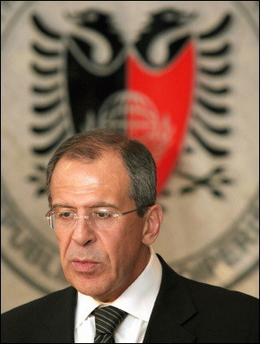|
Rice, Lavrov expose widening US-Russia rift
(Reuters)
Updated: 2006-03-08 10:07
The top diplomats from Russia and the United States exposed their countries'
widening rift on Tuesday, publicly airing disagreements over how to curb Iran's
nuclear programs and other issues, such as trade and democracy.

Russian Foreign
Minister Sergei Lavrov, pictured, February 2005, is to arrive in
Washington amid increasing tensions in US-Russia ties and skepticism among
Moscow's allies about its membership in the G8.
[AFP] | At a news conference, US Secretary of
State Condoleezza Rice and Russian Foreign Minister Sergei Lavrov departed from
their past practice of keeping their differences behind closed doors and
exchanged complaints about the other's policies.
After Rice said she had expressed US worries about Russia's democracy, Lavrov
retorted that Moscow too had concerns about the United States and complained
that Washington was the sole hold-out blocking its entry to the World Trade
Organization.
Lavrov, on his first visit to Washington as foreign minister, did seek to
stress areas of cooperation such as non-proliferation but even then acknowledged
that the United States and Russia typically disagreed on tactics.
"Despite the fact that our methods in achieving the goals are not usually --
do not necessarily coincide or are identical, however, the goals ... in our
cooperation are identical and are shared," he said.
This month, Russia undercut America's drive to isolate Hamas by hosting the
militant group in Moscow following its victory in Palestinian elections.
Lavrov touted the talks as the start of persuading Hamas to accept
Palestinian-Israeli peace accords as demanded by major broker powers, including
the United States, which has eschewed direct contact with Hamas.
Rice did not comment on Moscow's discussions with Hamas but her spokesman
Sean McCormack played down their significance saying the group had not made any
new commitments. "I did not hear anything different from Foreign Minister
Lavrov," he said.
Russia has also in recent days been seeking to forge its own agreement with
Iran to curb its nuclear programs and slow the U.S. campaign for eventual UN
Security Council sanctions against the Islamic republic.
After meeting President George W. Bush at the White House, Lavrov tersely
dismissed a reporter's question asking if Russia supported sanctions. "Have you
seen a proposal for any sanctions? This is a hypothetical question," he said.
Hours before Lavrov arrived in Washington, the United States rejected what
diplomats said was a Russian compromise proposal to allow Iran to do some atomic
research for programs it says are solely for generating electricity.
That prompted Lavrov to deny at the news conference that Russia had a formal
proposal, a U.S. official said.
Patrick Clawson of the Washington Institute for Near East Policy, said the
Russian idea could hurt Rice's year-long effort to change a widespread
perception that the United States was to blame for the failure of negotiations
with Iran.
"This is a problem for the United States," he said.
SOUL AND SUSPICION
Russia's diplomatic moves on Iran and Hamas come amid rising strains over
what Washington sees as President Vladimir Putin's increasing grip on power, one
that belies his status as chair of July's summit of the Group of Eight
industrialized democracies.
On Tuesday, Rice and Lavrov stood stiffly and at one point the Russian had to
reassure Rice, a former Soviet specialist, he had not planted a question from a
Russian journalist about trade.
"You confirm that you did not (plant it), right?" said Rice, who has
complained about the erosion of media freedoms under Putin.
That sense of suspicion contrasted with the early days of Bush's presidency
when Bush said he trusted Putin after looking into his soul.
|